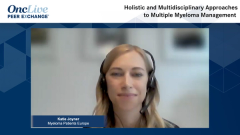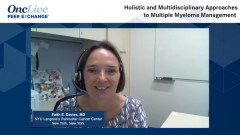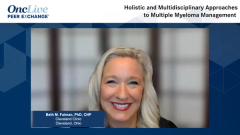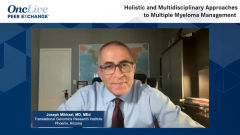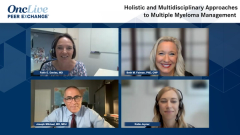
Impact of Clinical Trials on the Management of Multiple Myeloma
Continuing its discussion on clinical trials in multiple myeloma, the panel emphasizes the impact that data may have on the real-world treatment landscape.
Episodes in this series

Transcript:
Faith E. Davies, MD: Joe, coming to you … I [have] a couple of questions for you. One would be on a day-to-day basis, how do you use the data from clinical trials to help inform your … patient decisions?
Joseph Mikhael, MD, MEd: Thankfully, I’ve been treating myeloma for about 25 years now. I don’t think we’ve had a year where there have been more exciting developments in clinical trials. And ... we always have to proceed with some degree of caution that just because something showed some promise in a small study of 30 patients, it’s not going to immediately change what I’m doing in practice. But ... the way I like to look at it is, I like to … see the trends even in the design of the clinical trials … of how we’re affecting practice. For example, we’re now seeing in frontline therapies for older or [frailer] patients a significant reduced use of dexamethasone [dex] even in the design of these trials. And ... we’re moving in a way that is trying to be more patient-friendly, recognizing that dex has a role, but we’ve probably over-dexed people for a long period of time.
So ... there’s … the general trends, but then there’s also the very specific things that are happening. It’s really quite remarkable how quickly we see these trials presented at big meetings like … the annual meetings of ASH or ASCO or EHA [European Hematology Association]. And not long thereafter, we’re seeing these drugs approved. And so, for me to be able to know not just what was the result of the trial, but also specifically the adverse events and how they’re managed. I say this all the time. There is no drug we use in myeloma today that we use the way it was first introduced. So, every drug goes through an evolution.
We can go through lists and … I’m not here to talk about specific agents per se, but every drug has gone through an evolution that does 2 things … increases its efficacy and reduces its toxicity. And so, having an eye to what’s happening in a trial, understanding that there is a learning process that yes, I want to be evidence-based and do it the way they did it in the trial, but also recognizing that there are those … posttrial manipulations that have really benefited our patients in the long run. And so ... making sure that I have a good ear to that and the discussions and listening to OncLive® discussions and others where … experts in the field are saying, look, this is how we did in the trial, but this is why we saw so much neutropenia. This is why we … saw so much neuropathy or so much cytokine release syndrome, or infections after the fact. And this is what we’re doing now. So, it goes back to basic medicine that you learn the evidence, but then you apply it to your individual patient and that application becomes really the secret sauce of benefit to that patient.
Faith E. Davies, MD: I completely agree. And I suspect to some extent you … do something similar to me, like I was talking about earlier. We have all of these patients [who] sit in our clinic [who] would never have been eligible for the clinical trial because they maybe have diabetes, as well as their myeloma. So, their creatinine is up a little bit or something like that. And so, I’ve personally been using a lot of … real-world data most recently to try and learn how I can apply … some of [those] new clinical data to my own practice. I don’t know if you have any thoughts on that as well, Joe?
Joseph Mikhael, MD, MEd:Oh, absolutely. In fact, I’m sorry that I neglected to mention it, but that’s another major wave that, in fact, I’ve been very thankful to see. And I’m sure you [are as well] as both an author and as a reviewer for multiple journals. It’s amazing how much more real-world evidence we’re seeing now. We’re seeing this application … in the real-world setting. And there’s great emphasis on … not just testing a drug in this ideal setting, as it were, where no one has any comorbidity … and they’re young and they live next door to the academic center and everything is … in this prime world. Yes, we need to do that to some degree to understand safety and the like.
But ... we’re seeing now application of these things in the real world, so much influencing our field. There are so many patients, for example, [who] may have been entirely ineligible for CAR T-cell therapy based on renal insufficiency, based on other comorbidities. Now, with real-world evidence, we’re saying, no, [these are] patients on dialysis, I can still take them through CAR T. And so, I 100% agree with you. I pretty much always agree with you, Faith. But I particularly agree with you on this point that the, if you will, formal, historical clinical trial evidence is groundbreaking. But to actually consolidate that with real-world evidence is becoming more and more important.
Faith E. Davies, MD:And ... certainly in the US, the FDA is very much keen on having real-world evidence as well now to help provide that value proposition. Katie, do you have anything more you want to add on that?
Katie Joyner: No, it’s just that there’s a significant emphasis on gathering real-world data in Europe, as well. We know that the trial is not the clinical office. Right? So, we need real-world data to understand what the actual impact is on a population that isn’t fit for a trial. And then from our perspective, in terms of education … like Joe was saying, the latest clinical data that [are] coming out, we keep up on that and we interview KOLs and other clinicians to try to distill the latest data from these trials down to the patient community who are interested and trying to keep up with all of these potential new therapies for them as well. So ... this is something we monitor in the patient community to make sure that we have a sense of what these options might be for patients, hopefully in the near future.
Faith E. Davies, MD: Super, excellent.
Transcript is AI-generated and edited for clarity and readability.


